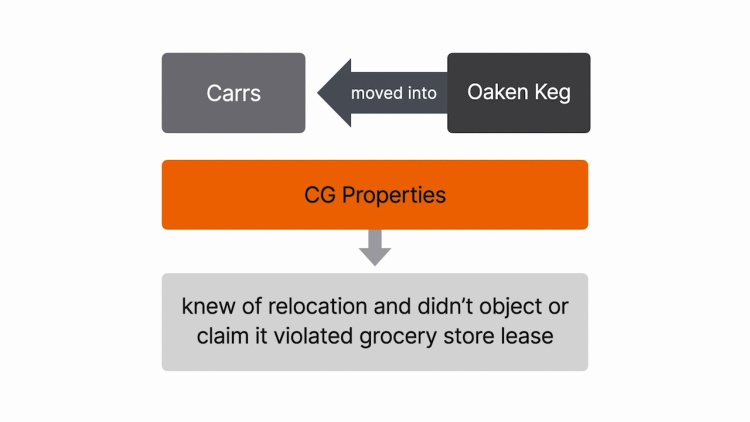Carr-Gottstein Foods Co. v. Wasilla, LLC
Alaska Supreme Court
182 P.3d 1131 (2008)

- Written by Josh Lee, JD
Facts
CG Foods (Tenant) (defendant) leased space from CG Properties (Landlord) (plaintiff) in the Wasilla Shopping Center to operate a supermarket. A subsidiary of Tenant also operated a liquor store in the same shopping center. In 1996, the lease for the liquor store expired, and the Tenant moved it into the supermarket. The Landlord did not object and assisted with electrical work. The Tenant reported sales from the liquor store monthly to the Landlord to calculate rent. The Landlord borrowed money in 1998 and signed a sworn statement that the leases for the shopping center were not in default. In 1999, Safeway purchased the Tenant and requested that Landlord certify that the Tenant was not in default under the lease. The Landlord did not sign the certification, but it did not object or say that the Tenant was in default. In 2002, the Landlord wrote the Tenant and Safeway a letter that stated that the lease was in default. The Landlord sued the Tenant, Safeway, and the liquor store subsidiary for breach of the lease. The trial court ruled in favor of the Landlord based on breaches of the lease related to the sublease to the liquor store and the limitation of the use of the premises for the operation of a general food supermarket. The Tenant, Safeway, and the liquor store subsidiary appealed to the Alaska Supreme Court.
Rule of Law
Issue
Holding and Reasoning (Matthews, J.)
What to do next…
Here's why 911,000 law students have relied on our case briefs:
- Written by law professors and practitioners, not other law students. 47,100 briefs, keyed to 997 casebooks. Top-notch customer support.
- The right amount of information, includes the facts, issues, rule of law, holding and reasoning, and any concurrences and dissents.
- Access in your classes, works on your mobile and tablet. Massive library of related video lessons and high quality multiple-choice questions.
- Easy to use, uniform format for every case brief. Written in plain English, not in legalese. Our briefs summarize and simplify; they don’t just repeat the court’s language.





